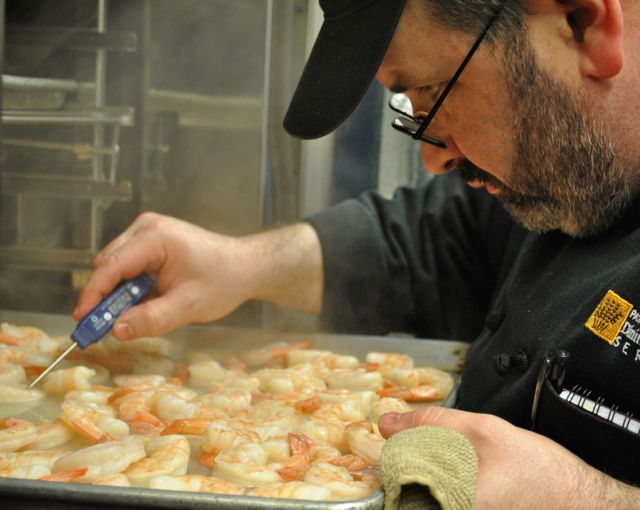Page 52 • (734 results in 0.036 seconds)
-

PLU chef Erick Swenson ’91 checks on a tray of shrimp from the oven. Food For Thought By Katie Scaff ’13 Twenty years ago, you’d never find pav bhaji – a curry dish served on dinner rolls – alongside the burgers and fries in the…
cook for themselves. Some, like applied physics and computer science double major Tim Hurd ’13, who has lived off campus for more than a year, find themselves reinventing the meaning of cooking. Hurd draws his food-spiration from a book his grandma and mom bought him in high school. The book, “A Man, a Can, a Plan,” epitomizes a man’s approach to cooking, with dense laminated cardboard pages and recipes that require a large number of canned and pre-prepared food items – but for Hurd it’s perfect
-
The OHSU Equity Research Program offers an exciting opportunity for diverse undergraduate college students to spend eight weeks working on research projects alongside faculty, scientists and graduate students. The application deadline is January 23, 2023 at 5 PM Pacific Time. Apply here: https://ohsu.ca1.qualtrics.com/jfe/form/SV_23KIeLLRu8E4wdM Examples of…
2023 OHSU Summer Equity Internship Program Posted by: nicolacs / December 7, 2022 December 7, 2022 T
-
Looking for a virtual and paid summer internship to enhance your STEM education? Interested in working virtually for a world-class research facility? The APS/IBM Research Internship for Undergraduate Women and Underrepresented Minorities program is offering two virtual undergraduate internship opportunities for women and underrepresented minorities. The goal…
APS/IBM Research Internship for Undergraduate Women and Underrepresented Minorities Posted by: nicol
-
The City of Tacoma is hosting a Mix & Mingle event where you can meet with engineers, engineering techs, and other staff from Power, Water, Environmental Services, Public Works, & Planning & Development Services engineering disciplines. This is an opportunity to learn about what it’s…
City of Tacoma Engineering Mix & Mingle Posted by: nicolacs / December 2, 2022 December 2, 2022 The
-
The Fred Hutchinson Cancer Research Center (Fred Hutch) hosts a summer internship that is designed to provide biomedical research experience and mentorship for undergraduate students of rising senior status. About the Summer Undergraduate Research Program (SURP) The SURP is an intensive, 9-week internship designed to provide…
Fred Hutch Summer Undergraduate Research Program Posted by: nicolacs / November 17, 2020 November 17
-
The Department of Energy’s (DOE) Office of Nuclear Energy (NE) announced a new request for applications (RFAs) for the Innovations in Nuclear Energy Research and Development Student Competition, seeking to recognize and award published graduate and undergraduate students for innovative nuclear energy research. This program…
Innovations in Nuclear R&D Student Competition Posted by: nicolacs / January 26, 2023 January 26, 20
-
Tuesday, April 6 at 12:00pm to 1:00pm Jubilant HollisterStier (JHS) is a national leader in contract pharmaceutical manufacturing. JHS provides specialized manufacturing for the pharmaceutical and biopharmaceutical industries. Join this virtual career trek to the Spokane, Washington office of JHS with other Pacific Northwest colleges and universities. The Trek will…
Jubilant HollisterStier (JHS) Virtual Career Trek Posted by: nicolacs / March 30, 2021 March 30, 202
-
If you missed the virtual panel in the fall – or if you just want more information about the Knight Campus Graduate Internship Program – they are hosting one last virtual panel before the application deadline and you are welcome to join. Virtual Alumni Panel…
Knight Campus Graduate Internship Program Posted by: nicolacs / January 25, 2022 January 25, 2022 If
-
The Molecules Meet Materials REU site at the University of South Dakota will support the training of 10 students for 10 weeks during summers 2022-2024. In this program, participants pursue collaborative research projects, with a focus on chemistry at interfaces in which molecular processes occur…
Molecules Meet Materials (M3) REU Site University of South Dakota Posted by: alemanem / January 23,
-
We would like to let you know about the upcoming Pacific Northwest National Laboratory (PNNL) Lab Day on Friday May, 14 th from 7:45-1:00pm PST. PNNL Lab Day is held every year and is designed for undergraduate and graduate students in the Pacific Northwest…
Pacific Northwest National Laboratory – Lab Day Posted by: nicolacs / April 7, 2022 April 7, 2022
Do you have any feedback for us? If so, feel free to use our Feedback Form.


